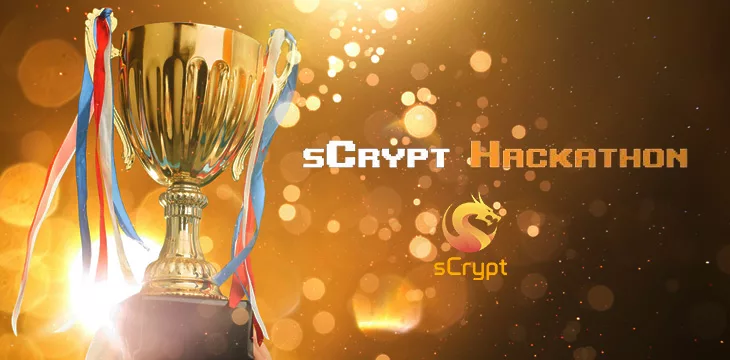
|
Getting your Trinity Audio player ready... |
A blockchain app to fix pre-paid cash transactions at gas stations is the winner of sCrypt’s 2024 Hackathon event, taking $5,000 in prize money. The company this week announced its top 10 best projects from the event, a list that includes The Bitcoin CPU to execute code on-chain, The Auoz gold-based stablecoin, and the Satoshi Dragons NFT game.
The theme for the 2024 Hackathon event was “merging sCrypt with Ordinals (Bitcoin smart contracts and tokens) to pioneer innovative solutions in the blockchain space.” sCrypt co-founder and CEO Xiaohui Liu previously said he hoped to discover “Bitcoin’s killer app,” an indispensable solution that would bring new users to the BSV blockchain.
The event kicked off with a two-day, in-person presentation series at San Francisco’s Fairmont Hotel in March, where participants watched sessions introducing them to the BSV blockchain and its latest enhancements, particularly in the tokenization/Ordinals area. You can see the complete list of 14 projects built on the sCrypt Hackathon 2024 homepage.
What problem does Gassed-Up solve?
The Gassed-Up developers described their project as solving the “trust dilemma” and “trust asymmetries” at gas stations that demand pre-payment before filling tanks. Gas stations don’t trust their customers to pay after filling up, but cash-using customers don’t know exactly how much they’ll be spending before they do. Even for customers paying with credit/debit cards, these systems will place a pre-authorization hold on the card and charge fees for the service.
Gassed-Up has two solutions to the problem: it also pre-authorizes the transaction, but does so within a Bitcoin smart contract, saving money on bank fees. Secondly, it also permits customers to pre-authorize a set amount that can stop the pump automatically when reached. The three-person team of Ryan Wold, Matt Archbold, and Kevin Healy said about their experience:
“We decided to participate in the sCrypt Hackathon to learn about Bitcoin’s Script capabilities using the sCrypt smart contract library. The learning curve was steep but (we) got over it by pair programming, the tutorials, and documentation.”
Other sCrypt Hackathon judges’ favorites
sCrypt released a list of the event’s 10 favorite projects, which were shortlisted by a judging panel and community votes.
In order of preference (after Gassed-Up at #1), the list includes the following:
The Bitcoin CPU (Hackstreet Boys): This utilizes the “Everett CPU” described in concept by Project Babbage‘s Ty Everett (also a member of the dev team) at the recent BSV DevCon event in London. It’s a way to perform computational tasks using Bitcoin transactions in problems where the number of iterations isn’t known when the problem is proposed. It also solves the problem of a malicious actor who attempts to broadcast partial solutions to put the CPU’s state into an untenable position.
Satoshi Dragons is a game where a 1Sat Ordinals NFT collection of “dragons” can battle or interact with each other after minting. Smart contracts perform tasks like evaluating skills and power levels, and making challenges.
BlockTrust (Yusuf Idi Maina) is a transparent ledger of property ownership aimed at the real estate market, eliminating intermediaries like agents, lawyers and escrow services. It also facilitates cross-border transactions and a global property market.
OneSatRollup (TwoStack/Stephan February) is a means to perform P2P token exchanges of 1Sat Ordinals without requiring a background indexer to constantly scan the blockchain for new transactions. It also requires fast Zero-Knowledge Proofs, which February described as “quite the challenge.”
mediumSV (snippet) is a means to secure content authenticity and onwership with an immutable record of public works. This would help to combat plagiarism and unauthorized content use, as well as allow content creators to license their work and manage rights.
Smart Ordinals (Mao On Chain) turns stateless UTXO scripts into stateful ones, simplifying the process of creating 1Sat Ordinals tokens, reshaping/re-inscribing an existing one, transferring ownership, and “melting” the tokens.
Autochaintrade App (Bluehackers): As the name suggests, this app is aimed at the auto market and creates a unique NFT as a pair to a physical vehicle, tracking its appearance and other identifying attributes, as well as its ownership provenance across multiple sales/transfers.
Facial-Identity-Verification (Ak47snippet/Shubham Gautam) attempts to solve problems of trust, security and privacy in facial recognition systems, recording interactions with the data, verifying authenticity, and locking/unlocking access to the data as required.
Auoz (Andrea Negro) is a BSV-21 fungible stable-price token representing the value of one troy ounce of gold, backed by an amount of Bitcoin locked in a smart contract. An oracle tracks both the XAU and BSV price, unlocking only when the BSV/XAU exchange rate is greater than or equal to the rate at locking time.
The Hackathon required working proofs-of-concept to qualify a successful entrant. This means projects will need further work to become products, or achieve commercial viability. However, the hope is that shortlisted projects will gain extra exposure from the event, as well as valuable feedback, before their developers go out into the world to develop the ideas further.
Watch: sCrypt makes smart contracts possible on the BSV blockchain

 11-21-2024
11-21-2024


